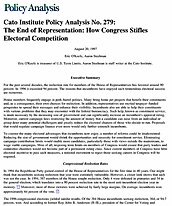House members frequently engage in pork-barrel politics. Many bring home pet projects that benefit their constituents and, as a consequence, their own chances for reelection. In addition, representatives use myriad taxpayer-funded perquisites to spread their messages and enhance their visibility. Incumbents also are able to help their constituents with various problems that they may encounter with the federal bureaucracy. Such help, known as constituent service, is made necessary by the increasing size of government and can significantly increase an incumbent’s approval rating. Moreover, current campaign laws restricting the amount of money that a candidate can raise from an individual or group deter many potential challengers and greatly reduce the electoral chances of those who decide to run. Proposals that would regulate campaign finance even more would only further entrench incumbents.
To counter the many electoral advantages that incumbents now enjoy, a number of reforms could be implemented. Reducing the size of government would shrink the opportunities and necessity for constituent service. Eliminating campaign contribution limits would enable more candidates, particularly those with views outside the mainstream, to wage viable campaigns. Most of all, imposing term limits on members of Congress would ensure that party leaders and committee chairmen would not become part of a permanent ruling class. Since current members of Congress have little electoral incentive to pass such measures, a national movement to reject those seeking careers in Congress will be required.

